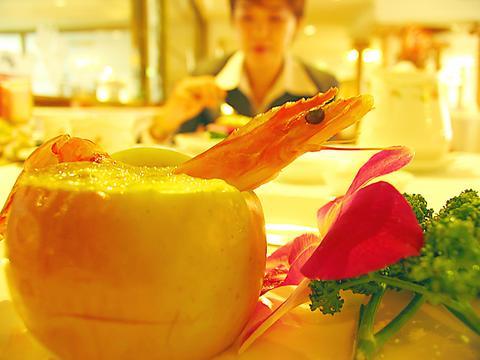For a fruity meal fit for a king take a ride up Linsen North Road to the Gloria Prince Hotel and enjoy a combination of sweet pulps, savory meats and fish -- including some rare and unusual items even the most experienced gourmand may not have tried before.
Once you are seated in the elegantly appointed dining room, with its gilded furniture and brightly polished chandeliers, settle down for what could be a two-hour plus gastronomic experience.

PHOTO: JULES QUARTLY, TAIPEI TIMES
There are nine items on the Fruit Set Menu, which was devised by head chef Peter Wu in June and has been continued because of its popularity. The winner of two consecutive cordon bleu contests in Taiwan, Wu hails from Hong Kong and specializes in Cantonese cooking, which he has internationalized for the local and high-end traveler set he services.
The only man to have been the head chef for two presidents on overseas trips (Lee Teng-hui (
The set menu begins with fiery dragon fruit canapes and ends with a mango ice crush. In between the highlights were some highly inventive dishes, only one of which did not succeed, in this reviewer's opinion. That was the seafood and apple with mayonnaise sauce, which looked good enough, but was slightly sickly with the combination of sweet apple and overbearingly rich mayo.
The rest was an adventure for the taste buds that was rewarded by some original and flavorsome combinations. The pumpkin with egg and fried shark's fin was a revelation. The scooped-out half-pumpkin, steamed and filled with lightly fried eggs and bean sprouts, set off the delicately prepared shark's fin. Usually, I find the taste of shark's fin unremarkable, but on this occasion it was a treat. The sharks used are farmed, apparently, so conservationists need not be upset. The dish came with one of the most delicious clear broths I have ever tried. Made from ham, chicken, pork ribs, pumpkin, dried scallops and spices (the chef refuses to disclose), it is boiled, reduced and strained for days to form a golden nectar that is strong, yet refined in taste.
Braised beef and mango went together surprisingly well, the scallop dishes were superb and the deep fried banana fruit rolls were impeccable.
However, the most remarkable dish, fittingly enough, came last. Hasma sweet soup in papaya sounds bland enough, but the reproductive glands of the snow frog, dried, rehydrated and double-boiled with rock sugar, is a unique culinary invention that was previously only eaten by emperors. The hermaphrodite snow frog's sperm and ova form a glutinous and opaque dessert after cooking. It sounds weird and feels like tapioca in the mouth, but with a slightly salty after taste. Yes, indeed, a funny experience.

Taiwan has next to no political engagement in Myanmar, either with the ruling military junta nor the dozens of armed groups who’ve in the last five years taken over around two-thirds of the nation’s territory in a sprawling, patchwork civil war. But early last month, the leader of one relatively minor Burmese revolutionary faction, General Nerdah Bomya, who is also an alleged war criminal, made a low key visit to Taipei, where he met with a member of President William Lai’s (賴清德) staff, a retired Taiwanese military official and several academics. “I feel like Taiwan is a good example of

March 2 to March 8 Gunfire rang out along the shore of the frontline island of Lieyu (烈嶼) on a foggy afternoon on March 7, 1987. By the time it was over, about 20 unarmed Vietnamese refugees — men, women, elderly and children — were dead. They were hastily buried, followed by decades of silence. Months later, opposition politicians and journalists tried to uncover what had happened, but conflicting accounts only deepened the confusion. One version suggested that government troops had mistakenly killed their own operatives attempting to return home from Vietnam. The military maintained that the

Before the last section of the round-the-island railway was electrified, one old blue train still chugged back and forth between Pingtung County’s Fangliao (枋寮) and Taitung (台東) stations once a day. It was so slow, was so hot (it had no air conditioning) and covered such a short distance, that the low fare still failed to attract many riders. This relic of the past was finally retired when the South Link Line was fully electrified on Dec. 23, 2020. A wave of nostalgia surrounded the termination of the Ordinary Train service, as these train carriages had been in use for decades

Lori Sepich smoked for years and sometimes skipped taking her blood pressure medicine. But she never thought she’d have a heart attack. The possibility “just wasn’t registering with me,” said the 64-year-old from Memphis, Tennessee, who suffered two of them 13 years apart. She’s far from alone. More than 60 million women in the US live with cardiovascular disease, which includes heart disease as well as stroke, heart failure and atrial fibrillation. And despite the myth that heart attacks mostly strike men, women are vulnerable too. Overall in the US, 1 in 5 women dies of cardiovascular disease each year, 37,000 of them